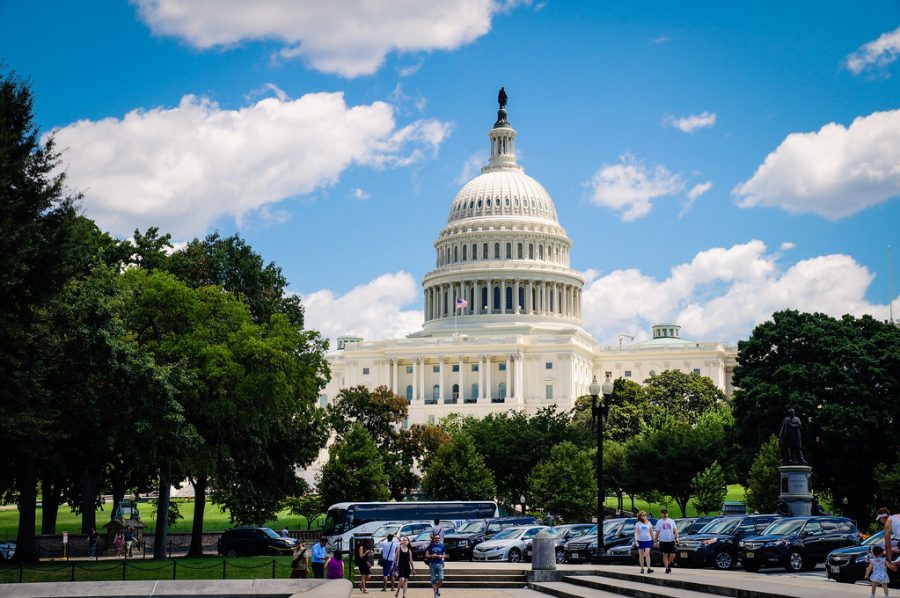Op-ed: The busted filibuster: time to move on
The filibuster is a major issue in American politics and the legislative system.
February 9, 2022
In recent years, if you see the word “Senate” in a news headline, odds are the word “filibuster” followed shortly after. A frequent fixture in the political realm as of late, the filibuster has slowed Senate proceedings to a halt, stopping important bills and tedious votes in their tracks.
So, why is a tactic that was created and used in the 1800’s consistently barricading bipartisan progress in office today? Unfortunately, there is no easy answer; the ancient practice has political proceedings in a chokehold, used more as a weapon instead of the democratic tool it was intended to be. In order for American politics to return to a fluid and functioning state — something desperately needed in the polarized political climate of today — the filibuster has to go.
The filibuster dates back to the 1800’s, originally (and appropriately, I might add) named after the Dutch word for “freebooters” or “pirates.” In its early stages, senators had to continue speaking individually or as a team for hours on end until one side finally relented. The purpose of the filibuster was to slow debate on controversial topics.
Fast-forward to today, and the filibuster is being used on multiple legislative topics per week, causing much-needed proposals and bills to move through the Senate at a painstakingly slow pace. The practice is in no way defined in the constitution, but remains a relic in today’s Senate chamber, primarily used by the minority party in order to gain some say in passing legislation.
Essential to understanding the stakes of the filibuster is understanding how the Senate passes a bill in the first place. When a new bill is introduced, it gets sent to the suitable committee for initial examination and possible amendments. If and when that committee votes in favor of the bill, it gets sent to the Senate floor for further debate and either passage or rejection. A bill actually only requires a majority 51 votes to pass once debate has ended; however, it takes 60 votes to cut off debate and get to this point, essentially creating a “supermajority” that allows the filibuster to choke Senate progress and kill the bill in question.
While senators like Kyrsten Sinema, D-AZ, claim the filibuster is still necessary to ensure bipartisan collaboration, it can be seen time and time again that the practice does anything but bring the parties together. Former President Barack Obama is one of the largest proponents of abolishing the filibuster, arguing that it’s a “Jim Crow relic” standing in the way of important legislation like voter rights and gun control. He is correct.
A much-need voting rights bill was blocked in the Senate by a combination of Republican lawmakers and a divided Democratic base Jan. 19. This failed legislation, along with many others, was unable to reach the 60 vote threshold needed to break the filibuster and pass through the Senate.
As in most scenarios of late, 48 Democrats and 2 Independents banded together in an attempt to pass the bill while all 50 Republicans stood staunchly in the way. The debate for voting rights stretched on for hours, but the filibuster ultimately won the battle. They were also unable to override the blockade and effectively alter the filibuster rules for this one bill, which would allow passage with just 51 votes instead of 60. Sens. Sinema and Joe Manchin, D-WV, sided with Republicans to defend the filibuster while simultaneously ignoring the need for voting rights, killing the rule change as well as killing the bill.
The ineffectiveness of the federal government is a reiterated complaint present across party lines, and the filibuster is one of the main reasons as to why. Common-sense bills, such as the Build Back Better Act or the restructuring of voting rights, fail in the senate either because of the filibuster or because of a single senator. Manchin single handedly killed Build Back Better to the detriment of Americans nationwide.
How does a first-world country like the United States progress if senators have the ability to stalemate any bill that doesn’t directly line up with their party agenda, even if it will benefit the greater American population? The point of having a majority party in the Senate is essentially nullified if the minority party can simply filibuster their way out of any bill they do not want to hear.
American democracy is dependent on lawmakers and legislation. The filibuster stands not only in the way of government efficiency, but also American success; without major reform in an especially divided political climate, it can be expected that bill after bill fails in the Senate due to the outdated and overused practice. It’s imperative that the filibuster is abolished for the betterment of our country, citizens, and democracy. If it stays, who knows what the implications will be for the future of our country.
What can you do to help? Northeastern students come from across the country; research your local senators and see where they stand on the issue. Sign petitions and contact your local senators offices to ask them what they’re doing to overturn the filibuster. All it takes to eliminate the filibuster is to formally alter the text of Senate Rule 22, which can be done with a simple majority vote in the Senate. The time is now to help our country and our democracy make substantial progress – the filibuster happens to be standing in the way.
Isabel Baron is a first year journalism major at Northeastern. She can be reached at baron.i@northeastern.edu.







